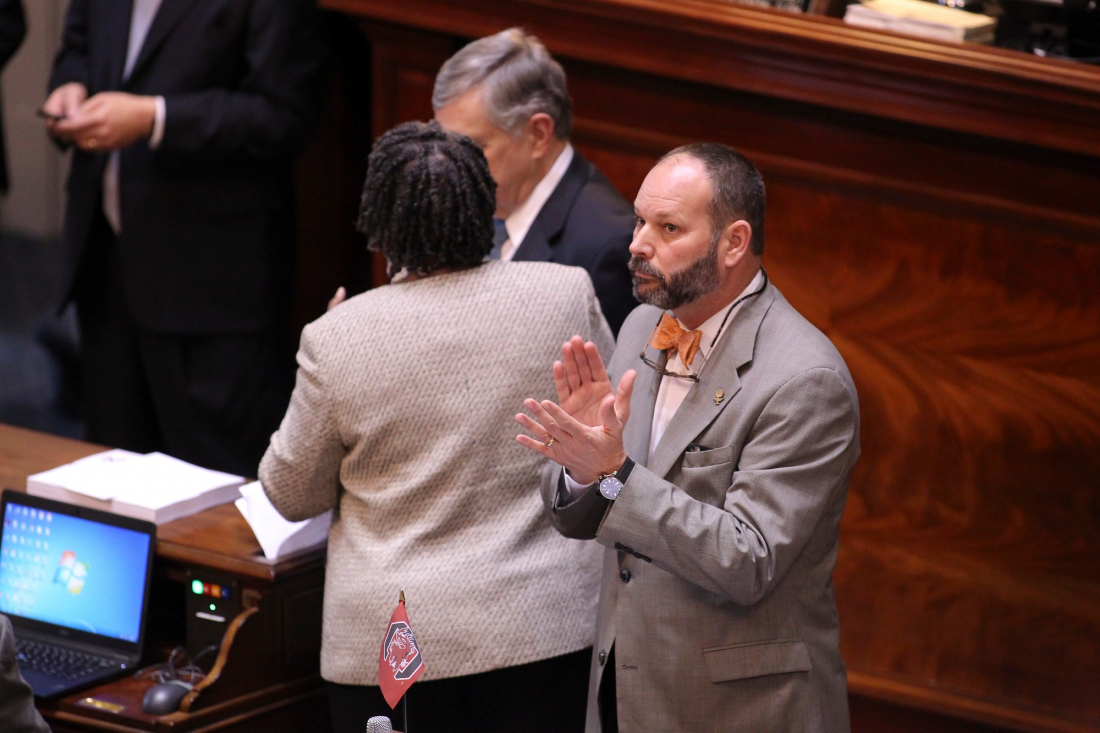Powerful South Carolina legislative leader Brian White is going to cruise to reelection in next week’s race for S.C. House District 6 (map) in Anderson County.
For awhile, this outcome wasn’t a certainty …
The chairman of the influential S.C. House ways and means committee – who has held this seat for 18 years – was targeted in January by some serious monied interests in the Upstate, and appeared to be in real electoral trouble. Fortunately for him, S.C. governor Henry McMaster rode to his rescue – intervening on his behalf and ultimately calling off some of the forces that had drawn a bead on him.
One establishment Republican bailing out another, right?
Indeed …
While White is safe in his seat (for the time being), he is currently staring down another challenge – this one involving a litany of ethical issues stemming from his lengthy tenure in the S.C. House of Representatives.
This news outlet has written extensively in the past on White’s various ethical problems. In December of 2014, we published an exclusive report detailing some highly questionable residency issues involving the powerful lawmaker – who sits on a host of influential executive branch committees in addition to chairing the legislative panel that gets the first shot at the state’s $30 billion budget each year.
White was embroiled in another controversy in 2014 after it was revealed that more than $20,000 in contributions to his campaign organization had been routed to a foundation and a charity associated with his wife, Courtney White.
Previously, in 2011, White was busted using campaign funds for a wide range of personal expenses. Luckily for him, his colleagues on the S.C. House ethics committee decided to look the other way (just as they did for former governor Nikki Haley when she was caught dead-to-rights violating state ethics law).
[su_dominion_video_scb]White’s issues were originally viewed as being part of the #ProbeGate investigation into corruption in state government, but that inquiry took another turn – focusing instead on the political empire of veteran GOP strategist Richard Quinn and his stable of state lawmakers.
The focus of state investigators and prosecutors may soon shift back to White, though …
Earlier this week, reporter Rick Brundrett of The Nerve (who broke the story about White allegedly routing campaign cash to his wife’s foundation four years ago) posted a sprawling report recapping the case against this powerful politician.
“Since he took over as the ways and means chairman in mid-2011 … state appropriations to public and private agencies to which (White) has financial ties have increased – substantially in several cases,” Brundrett noted.
Here are a few of the examples cited in Brundrett’s report …
- Since 2015, White, an insurance agent, has reported receiving insurance commissions totaling tens of thousands of dollars, mainly through policies purchased by five disability service organizations that annually get millions in funding from a state agency.
- Allocated state funds for one nonprofit organization that White earns insurance commissions through skyrocketed by nearly 119 percent since he became the Ways and Means chairman.
- White and his family for several years lived in a home formerly co-owned by the administrators of two private nursing homes that have received a total of more than $1 million in payments through contracts with a state agency while he has been chairman.
- White has reported receiving insurance-related payments through the firm of one of the state’s top lobbyists.
- White’s wife and the immediate past Ways and Means chairman both work at Tri-County Technical College, which received a 76 percent hike in state appropriations from when White took over as committee chairman to last fiscal year.
- The Joint Bond Review Committee and State Fiscal Accountability Authority in recent years have approved building projects for Tri-County totaling more than $4 million.
Many of these bullet points obviously reference stories that have been in the news before. So why rehash them now?
Well, state ethics laws have changed since 2014 – including laws governing income disclosure requirements. Further reforms could be in the works after the release of a grand jury report from the #ProbeGate investigation last month. In that report, grand jurors noted that “independent expenditures and ‘dark money’ have a significant influence on the outcome of elections because the General Assembly has failed to address statutory provisions that were deemed unconstitutional many years ago.”
They also argued “existing laws regulating the ethics of public officials, candidates for office, and lobbying activities are weak,” and called on state lawmakers to “strengthen the weapons available to prosecutors.”
Furthermore, grand jurors implored lawmakers to end their longstanding self-policing arrangements, arguing “state ethics laws should be strengthened to contain provisions which require suspension and removal from office without the supervision of the General Assembly.”
We concur with that recommendation wholeheartedly. In fact, we have been pushing hard for precisely such independent oversight for the better part of the last decade.
The only time there has been any real accountability over legislative misconduct in South Carolina is when federal or state investigators/ prosecutors have gotten involved. Left unto themselves, lawmakers and former lawmakers can be counted on to whitewash each other’s bad behavior … every single time.
(Click to view)
(Via: Provided)
Ashley Landess – who runs the S.C. Policy Council, the parent organization of The Nerve – knows this all too well.
Accordingly, in 2013 Landess took a complaint targeting then-S.C. speaker of the House Bobby Harrell directly to the office of S.C. attorney general Alan Wilson. Landess’ complaint triggered the #ProbeGate investigation – which brought down Harrell and four other prominent Republican lawmakers.
Obviously, this investigation took plenty of twists and turns – and Landess and Wilson did not always distinguish themselves as it unfolded.
Furthermore, #ProbeGate did not deliver the sort of sweeping justice and accountability many were expecting from it.
Still, the investigation was critically important in that it proved there is indeed a way – albeit a difficult one – around the corrupt, self-policing legislative “ethics” committees.
Essentially, if the attorney general (or his prosecutorial designee), the chief of the S.C. State Law Enforcement Division (SLED) and the presiding judge over the state grand jury all agree – investigations into sitting lawmakers can be initiated, conducted and ultimately brought to criminal charges and trials at the state level.
This is tremendously important … and the first real check against legislative corruption since the federal “Lost Trust” investigation of the early 1990s.
Landess is wasting little time in pressing her advantage, we are told. According to our sources, her organization is in the process of preparing another complaint for the attorney general to review – this one focusing on White’s myriad ethical issues.
“They expect to put it on Wilson’s desk some time after next week’s elections,” a source familiar with the situation told us. “The Brundrett article is the outline for the complaint.”
Wow …
Stay tuned. This news outlet will be sure to update our readers on the status of this developing situation …
***
WANNA SOUND OFF?
Got something you’d like to say in response to one of our stories? Please feel free to submit your own guest column or letter to the editor via-email HERE. Got a tip for us? CLICK HERE. Got a technical question or a glitch to report? CLICK HERE. Want to support what we’re doing? SUBSCRIBE HERE.
Banner: Travis Bell Photography

